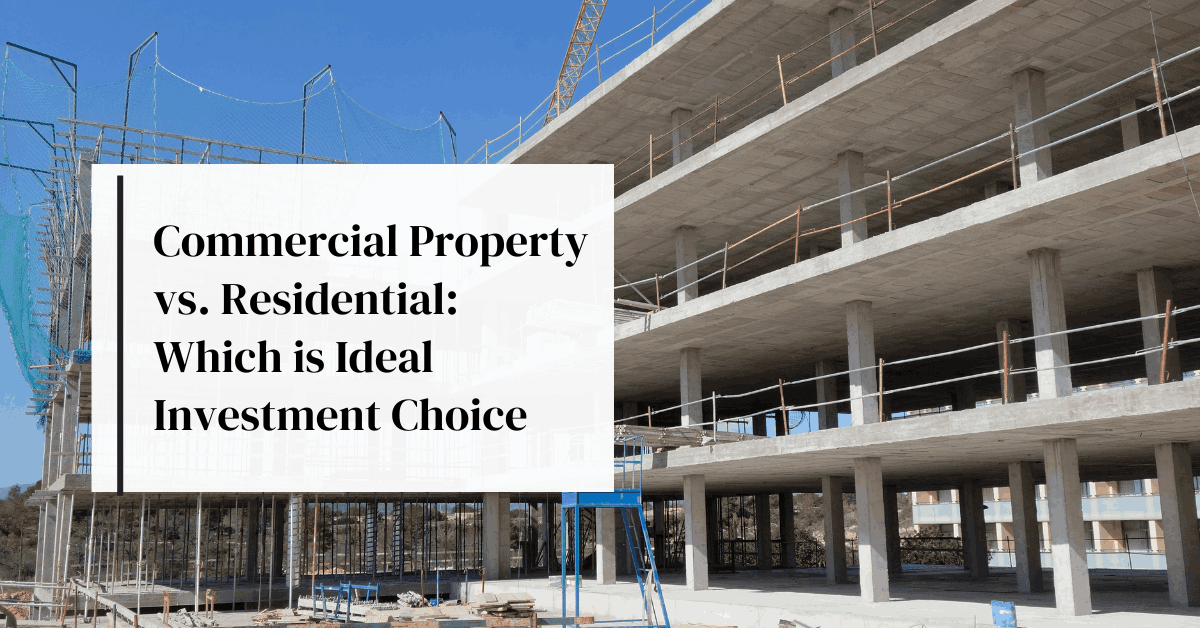
Commercial Property vs. Residential: Which is Ideal Investment Choice
Investment in real estate is tricky. Commercial property vs. residential, which one to buy? You are involved in a huge financial sum, and you don’t want to go wrong with it. Real estate investment is considered the safest form of investing; you are investing in a physical asset! Unlike the volatile stock market, you can rest assured of your principal no matter how bad the situation may be. Prices don’t waver daily, making it a very secure and reliable investment tool. But the question is, is it better to invest in commercial or residential property? This blog will explore in detail the various aspects of commercial or residential property investment for better clarity in your thoughts.
Commercial vs residential investment: how different they are?
Commercial and residential segments are two distinct markets with their dynamics. Residential properties are independent homes or apartments, villas, townhouses, studios, etc. A residential property may be self-used or rented. At the same time, your property price also appreciates.
Commercial property is any property that cannot be used for residential purposes; it is where you run your business from. These include offices, shops, hotels, hospitals, warehouses, etc. It has been observed that many companies prefer renting commercial space rather than having their own, considering the huge capital investment they need to make.
Commercial property vs. residential- how different these are from each other? The following pointers will help you make a choice.
Difference- Residential and Commercial Properties
Residential is one where you live or someone else lives, and commercial is where you carry out services/ business. Apart from this basic purpose, they are both different from each other in terms of their income potential, market dynamics, regulations, risk, and returns.
Regulations: Both commercial and residential properties are governed by different Government regulations and laws. Generally, there are designated areas for commercial properties. If at all there are commercial activities allowed in a residential area, these are limited to grocery shops, retail outlets, etc.
Income Potential: You buy a residential property either to live in or rent it out. A commercial property is bought for its own business or is rented. When not used by self, investment in both is about seeking rental income. In terms of rental income for commercial property vs. residential, a commercial unit will fetch you better rental income than the other.
Change in Economic Conditions / Market Dynamics
When evaluating commercial property vs. residential property, factors like housing demand, lending rates, etc., largely affect homebuying decisions. At the same time, demand for commercial properties is mostly driven by macro-economic conditions of the country, location of the commercial space, industry demands, etc.
Volatility/ Risk
Commercial properties are driven by economic conditions, making them quite risky to own. The occupancy of a unit may be affected by market-driven factors, too. In Covid times, many offices were shut down, and many of them moved to smaller spaces. The rentals came down heavily, affecting commercial property incomes. In comparison, the residential property offers a more stable income and is less risky. When deciding between commercial and residential investment, keep this in mind.
Cost
When comparing commercial property vs. residential, the cost makes a huge difference. A commercial property is way more expensive than a residential one.
Features of Commercial Property
Higher Appreciation
Commercial properties offer excellent appreciation for your investment compared to other asset types.
Cash-Flow is steady
Compared to other forms of investment like stocks, bonds, etc., a commercial property ensures steady cash flow in income.
Build Equity
Commercial property often fetches higher returns, helping you build reasonable equity in a shorter span. Parallelly, the property also appreciates.
Features of Residential Property
Rental Income
A residential property, when not used by oneself, gives you a steady income month on month. Along with rental income, you also keep building your equity.
Tax Benefits
If you buy a residential property using a home loan, you are entitled to tax benefits, too. You may claim benefits on the principal amount as well as the interest payout in the financial year.
Diversification
Portfolio diversification is necessary; you can’t put all your eggs in one basket. Keep some money for investment into other options as well.
Good Resale Value
Residential properties are generally easy to sell. If kept for a longer term, you may get good returns on your investment, too.
Final Thought:
If you are confused about making a real estate investment, this handy guide will help you identify the difference between residential and commercial property and assist you in making an informed decision. Whether residential or commercial, go through this reckoner and bet your money right.
When confused about commercial property vs residential property investment, refer to this handy guide to make a decision. Both have different uses and need to be looked at differently. Pick one that serves you best.

